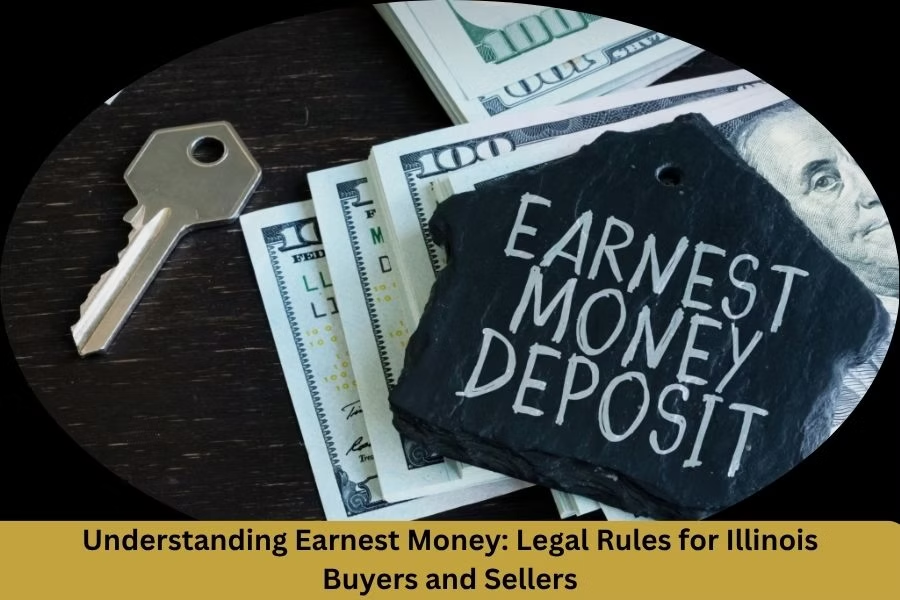In Illinois real estate transactions, earnest money plays a critical role in showing a buyer’s intent and commitment to follow through on a home purchase.
Though often misunderstood, earnest money is governed by specific legal rules that both buyers and sellers should understand to avoid disputes and ensure a smooth closing process.
At The Real Estate Law Firm, we assist clients across Illinois in navigating the legalities of earnest money agreements and resolving conflicts that may arise before closing.
Secure your transaction with our residential real estate experts.
What is Earnest Money?
Earnest money is a good-faith deposit made by a buyer to demonstrate their serious intent to purchase a property. It is typically offered when the purchase contract is signed and held in escrow until closing.
In Illinois, earnest money is not legally required, but it is standard practice in most residential transactions. The amount typically ranges from 1% to 3% of the purchase price, although it can be higher in competitive markets.
Purpose of Earnest Money
Earnest money serves several purposes:
-
Demonstrates good faith: Shows the seller that the buyer is serious
-
Compensates the seller: If the buyer breaches the contract without a legal excuse, the earnest money may serve as liquidated damages
-
Secures the property: Takes the home off the market while inspections and financing are finalized
At The Real Estate Law Firm, we advise both parties to treat the earnest money deposit as a mutual assurance of performance, safeguarded through proper documentation and escrow procedures.
Legal Requirements for Earnest Money in Illinois
While earnest money itself is not mandated by law, how it is handled and disbursed is strictly regulated.
-
Escrow Rules
Earnest money must be held in an escrow account, typically by:
-
A real estate brokerage
-
An attorney
-
A title company
Under Illinois Department of Financial and Professional Regulation (IDFPR) guidelines, licensed brokers who hold earnest money must:
-
Maintain a separate escrow account
-
Keep detailed records of all deposits and disbursements
-
Avoid co-mingling client funds with business or personal funds
Violating these requirements can result in license suspension or revocation.
-
Earnest Money in the Real Estate Contract
Earnest money provisions must be clearly spelled out in the purchase agreement. The Illinois REALTORS® Residential Real Estate Contract is commonly used and includes standard clauses detailing:
-
The amount of the deposit
-
Who holds the money
-
When it will be deposited
-
Conditions for return or forfeiture
The Real Estate Law Firm strongly recommends that buyers and sellers thoroughly review these terms and consult an attorney before signing.
Return and Forfeiture of Earnest Money
When Is Earnest Money Returned?
Earnest money is typically returned to the buyer if:
-
The seller breaches the contract
-
A contingency (e.g., financing or inspection) is not met
-
The buyer cancels within a contractually allowed period
If both parties mutually agree to terminate the contract, the escrow holder may require a signed release from both sides before disbursing the funds.
When Can the Seller Keep Earnest Money?
Earnest money may be forfeited to the seller if:
-
The buyer defaults without legal justification
-
The buyer fails to meet deadlines or other contract terms
-
The buyer backs out after contingencies are waived
However, sellers cannot automatically claim the money. Disputes over earnest money may require mediation, arbitration, or legal action under Illinois contract law.
At The Real Estate Law Firm, we help resolve these disputes efficiently, protecting your rights and financial interests.
Connect with our legal team for tailored real estate advice.
Common Disputes Over Earnest Money
Disagreements over who is entitled to the earnest money are among the most common legal issues in Illinois real estate. Typical disputes involve:
-
Unmet contingencies (e.g., loan denial, failed home inspection)
-
Misunderstandings over contract language
-
Delays in closing caused by either party
To reduce risk, both buyers and sellers should ensure:
-
Clear documentation of all communications and deadlines
-
Strict adherence to contractual obligations
-
Immediate legal consultation if a dispute arises
Our attorneys at The Real Estate Law Firm are experienced in both pre-litigation negotiation and formal litigation involving earnest money disagreements.
Best Practices for Buyers and Sellers
For Buyers:
-
Understand all contingencies and deadlines
-
Always get a receipt for your earnest money deposit
-
Avoid breaching the contract without legal grounds
For Sellers:
-
Don’t assume you can keep the earnest money automatically
-
Consult an attorney before refusing to release the deposit
-
Make sure the contract language supports your rights in a dispute
Whether you’re a first-time buyer or an experienced seller, The Real Estate Law Firm can help you navigate the complex legal landscape of Illinois real estate transactions.
Role of Attorneys in Earnest Money Disputes
Real estate attorneys are not only useful for contract review — they are crucial when problems arise. In Illinois, attorneys can:
-
Interpret contract terms related to earnest money
-
Negotiate on your behalf with the opposing party
-
File or respond to legal actions if disputes cannot be resolved informally
Working with a knowledgeable firm like The Real Estate Law Firm ensures your earnest money rights are protected and that you’re fully informed at each step of the transaction.
Conclusion
Earnest money is more than just a deposit — it’s a binding part of the real estate contract that can carry significant legal and financial consequences. Understanding the rules surrounding earnest money in Illinois can protect buyers and sellers from costly mistakes and disputes.
Whether you’re drafting a contract or dealing with an earnest money disagreement, The Real Estate Law Firm is here to provide the legal clarity and representation you need to move forward with confidence.
Have questions about your real estate transaction? Contact us now.
FAQs:
-
Is earnest money required by law in Illinois?
No, it is not legally required, but it is customary in most residential transactions. -
Who holds the earnest money in Illinois?
Typically, a real estate broker, attorney, or title company holds the money in an escrow account. -
How much earnest money is typical in Illinois?
Between 1% to 3% of the purchase price, but it can vary depending on market conditions. -
Can a buyer get earnest money back after backing out?
Yes, if they meet certain contingencies or cancel within an allowed time frame. -
What happens if both parties disagree over the earnest money?
The money stays in escrow until a mutual release is signed or a court resolves the dispute. -
How long does it take to get earnest money refunded?
It can take several days to weeks, depending on how quickly both parties sign the release. -
What is a mutual release form?
It is a document signed by both buyer and seller directing the escrow agent to release the funds. -
Can the seller keep the earnest money automatically?
No, the seller must establish a contractual breach and often needs legal resolution to claim it. -
Is earnest money the same as a down payment?
No, earnest money is a deposit held during the contract period; the down payment is made at closing. -
Should I have an attorney review my earnest money clause?
Absolutely. An attorney can ensure the clause is enforceable and protects your interests.




